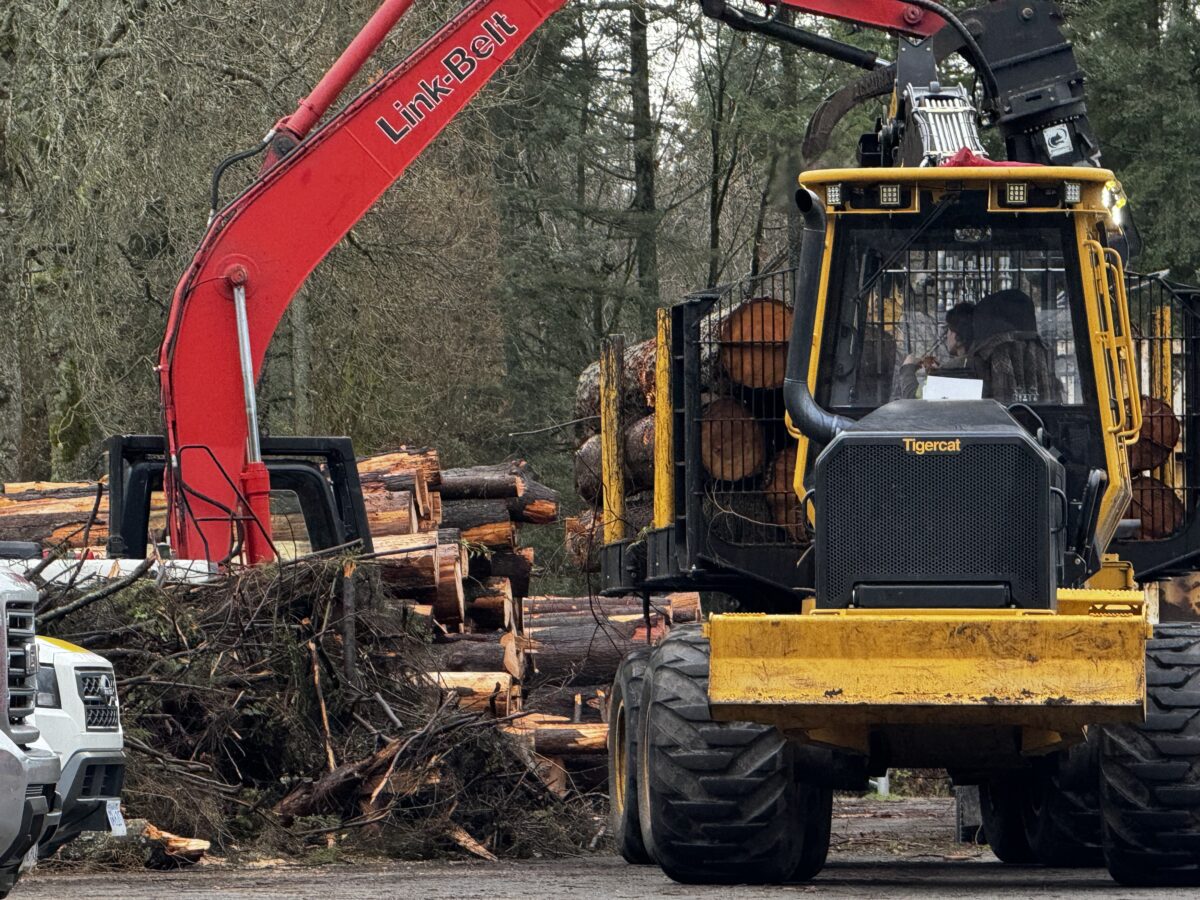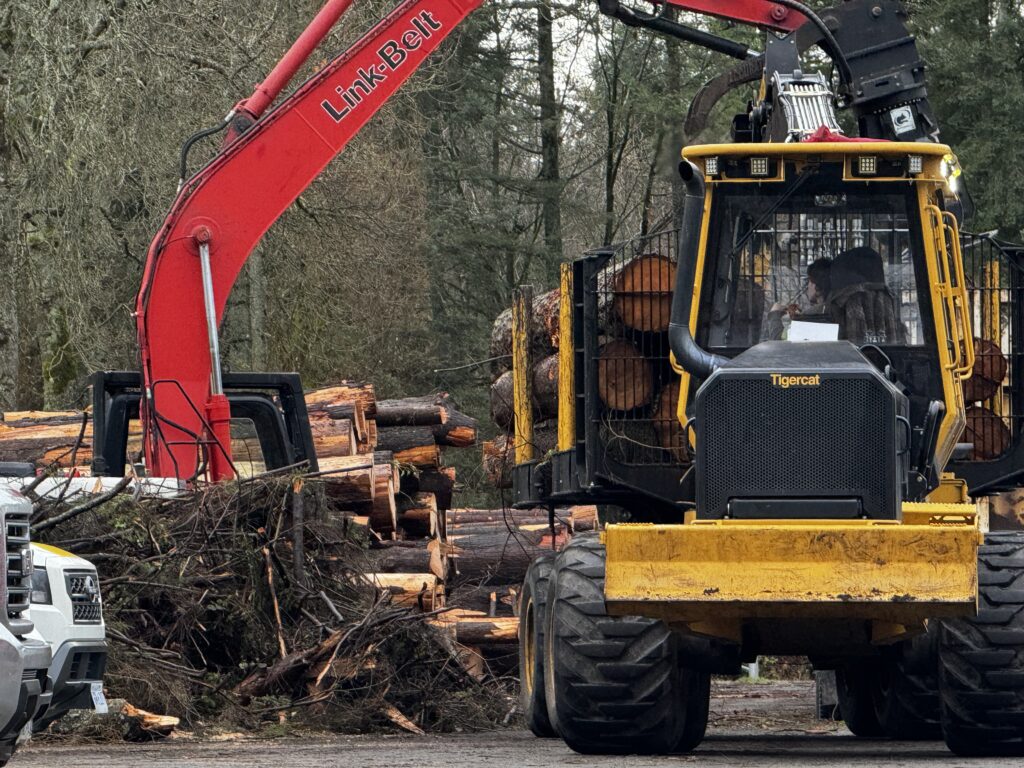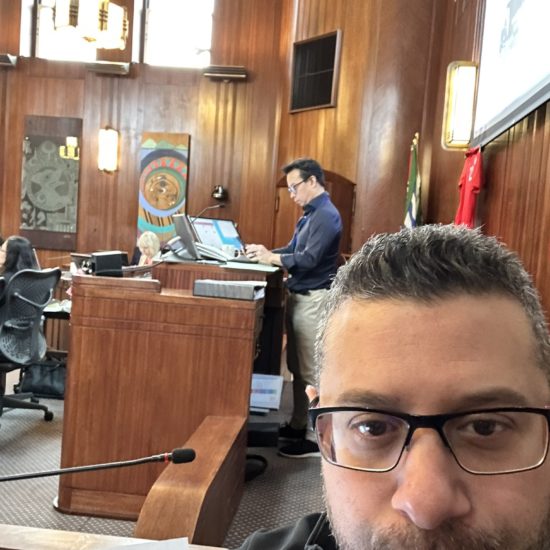
Bob Mackin
Top bureaucrats inside Vancouver city hall secretly approved spending $2.1 million last summer to remove tens of thousands of Stanley Park trees due to the Hemlock looper moth outbreak.

Crews load logged Stanley Park trees at a makeshift yard in the Prospect Point Picnic Area (Bob Mackin photo)
Deputy city manager Karen Levitt rubber stamped the emergency request on Aug. 8 from Colin Knight in the finance department, according to email released under the freedom of information law.
In the absence of city manager Paul Mochrie, Levitt consented to awarding a no-bid contract and overspending the Vancouver Board of Parks and Recreation budget.
“The over budget spending will be funded by revenue surplus in the Parks and Recreation revenue budget,” said Knight’s email.
Knight estimated $2.02 million for euphemistic “operational treatments” between Sept. 1 and Dec. 31 on 39 hectares around the Stanley Park Causeway and Stanley Park Railway. During the same time period, “prescriptions” on 55 hectares around the railway, Prospect Point, Brockton Point, Vancouver Aquarium and the steep area above the seawall, for $55,000.
The title page of the contract with managing contractor B.A. Blackwell and Associates Ltd. is dated Sept. 11, but the body of the agreement used Sept. 29. The agreement identified the Causeway, Railway and Pipeline Road as key areas for removal of “dead and declining hazardous trees,” between October and March in order “to minimize conflict with the breeding bird season, winter weather including high winds and busy visitor seasons.”
“It is the goal of this project to maximize the number of removals as part of this initial phase of a multi-year program to reduce the risk to public safety and potential for forest fires,” it said. “Any changes to the project phases, timelines and deliverables may be amended with prior Park Board approval.”
The contract was initially for $1.58 million plus $320,000 contingency, through the end of December with an option to extend until June 30. Blackwell was required to provide a detailed project plan, with clear milestones through the end of March, and report progress monthly to the Park Board.
“This includes removal and dispatch to MST (Musqueam, Squamish and Tsleil-Waututh First Nations), removal and dispatch all merchantable timber to appropriate site, obtain required permits for transportation and safe disposal of waste from site. Removals must be recorded and logged, and shared with Park Board project team staff as part of a summary report.”
The supplier “shall have the least possible adverse effect on the natural environment and in compliance with all environmental laws and consents, all at the supplier’s expense.” Blackwell agreed to take out insurance policies to cover a combined total of at least $19 million in claims for general, professional, pollution and automobile liability.
Thirteen Blackwell personnel are listed in an appendix, along with services from subcontractors. The subcontractors’ rates were withheld because they are considered trade secrets, but they are entitled to charge standard overtime rates of time-and-a-half after eight hours and double time after 10 hours. Subcontractors include Edith Lake Falling Ltd. and SkyTech Yarding Ltd. of Squamish and Swatez Forestry of Nanaimo.
Among the city’s responsibilities is coordination with the city’s communications team to “lead public engagement as needed.”
The city has not held a media briefing about the project and has refused to arrange an interview with city arborist Joe McLeod. On Nov. 29, it announced by news release a road closure schedule so that 160,000 trees could be removed.
City council spent five minutes on Jan. 24 to approve an urgent, $4.9 million one-time draw from the $80 million stabilization fund to carry on work already started. Jan. 24 is also the date of Blackwell’s “Stanley Park Hemlock Looper Moth Impact and Wildfire Risk Assessment” report, which the city kept secret until Feb. 9.
Support theBreaker.news for as low as $2 a month on Patreon. Find out how. Click here.











